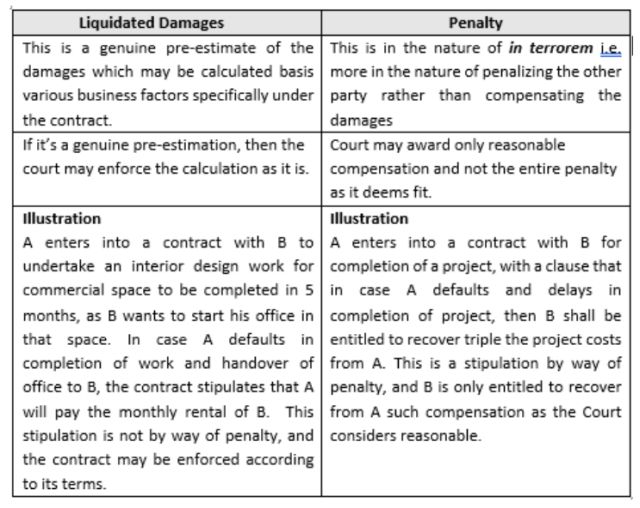- within Corporate/Commercial Law topic(s)
- within Energy and Natural Resources topic(s)
- with readers working within the Property industries
A. What is Liquidated Damages?
When Parties enter into a contract, sometimes the parties pre-estimate the damages that should be paid by the other party in case it defaults in performing its obligations under the agreement. This pre-estimated sum is known as liquidated damages. Black's law dictionary states the definition of liquidated damages as "The term is applicable when the amount of the damages has been ascertained by the judgment in the action, or when a specific sum of money has been expressly stipulated by the parties to a bond or other contract as the amount of damages to be recovered by either party for a breach of the agreement by the other"1
B. Are liquidated damages provided under the Indian laws?
Yes, the concept of payment of stipulated sums or penalty for breach is covered under section 74 of the Contract Act, 1872 (Act) and the rule is that if a sum is named in the contract as the amount to be paid in case of breach, then the non-breaching party (provided it has suffered damages) shall be entitled to such sums or lesser amounts, as deemed fit by the court.
Section 74: Compensation for breach of contract where penalty is stipulated for: When a contract has been broken, if a sum is named in the contract as the amount to be paid in case of such breach, or if the contract contains any other stipulation by way of penalty, the party complaining the breach is entitled, whether or not actual damage or loss is proved to have been caused thereby, to receive from the party who has broken the contract reasonable compensation not exceeding the amount so named or, as the case may be, the penalty stipulated for.
This position of law is however distinct in different jurisdictions and parties should specifically incorporate the provision as per the applicable law chosen by the Parties. For example, the English Law makes a specific distinction between penalty and liquidated damages.
C. Are the parties always entitled to all the sums named in the contract in case of breach?
No. The Act applies the uniform rule, that if the parties have stipulated a sum in the contract (whether the sum is construed to be a penalty or a pre-estimate of damages), the Court will award only reasonable compensation as deemed fit not exceeding the amount mentioned in the contract. Specifically, if the amount is found to be in the nature of penalty, then in such cases the Court shall reduce such stipulations but not strike it down completely (as done under the English law). This position is adopted as the parties are not supposed to be the adjudicatory authority and if the breach and injury is established, then the courts have the power to decide the breach and assess damages while the stipulated sum serves as the upper cap.
To understand this position better, an analysis is provided below:

D. Pre-conditions for claiming Liquidated Damages
Before claiming Liquidated damages, parties claiming damages must check:
- There is a valid contract existing between the parties.
- There is breach of contract causing some injury to the party.
- The party claiming damages has informed the defaulting party about breach of contract.
- Party claiming damages is not in fault.
E. How are liquidated damages to be calculated?
The Hon'ble Apex Court in Kailash Nath v. Delhi Development Authority[3] laid down the guidelines for determining whether parties are entitled to 'liquidated damages or reasonable compensation'. For the sake of brevity the basic principles are summarised below:
- Sum named in the contract is payable as the liquidated damages only if it is 'genuine pre-estimate of damages' otherwise the parties is entitled to only reasonable compensation not exceeding the fixed sum mentioned in the contract;
- If any penalty is stipulated in the contract then only reasonable compensation is awarded not exceeding the amount so fixed for the penalty;
- In case the court decides to award reasonable compensation, the basic principles of section 73 shall apply in assessment of compensation;
- Proof of damage or loss is a sine qua non for grant of reasonable compensation under Section 74 and such proof is dispensed only if damages are difficult or impossible to prove and liquidated damages are genuine pre-estimate of damages.
To view the full article, click here.
The content of this article is intended to provide a general guide to the subject matter. Specialist advice should be sought about your specific circumstances.


